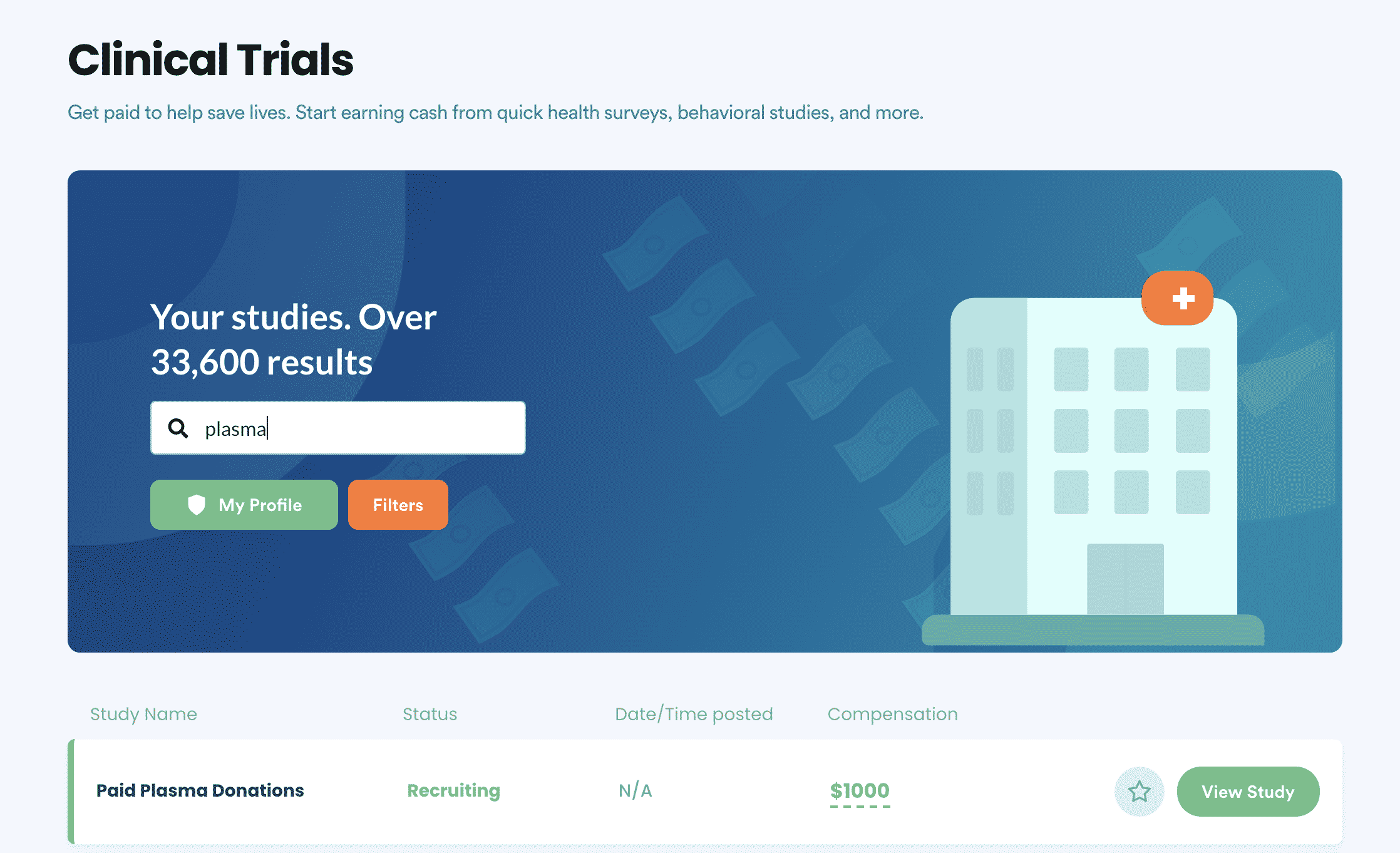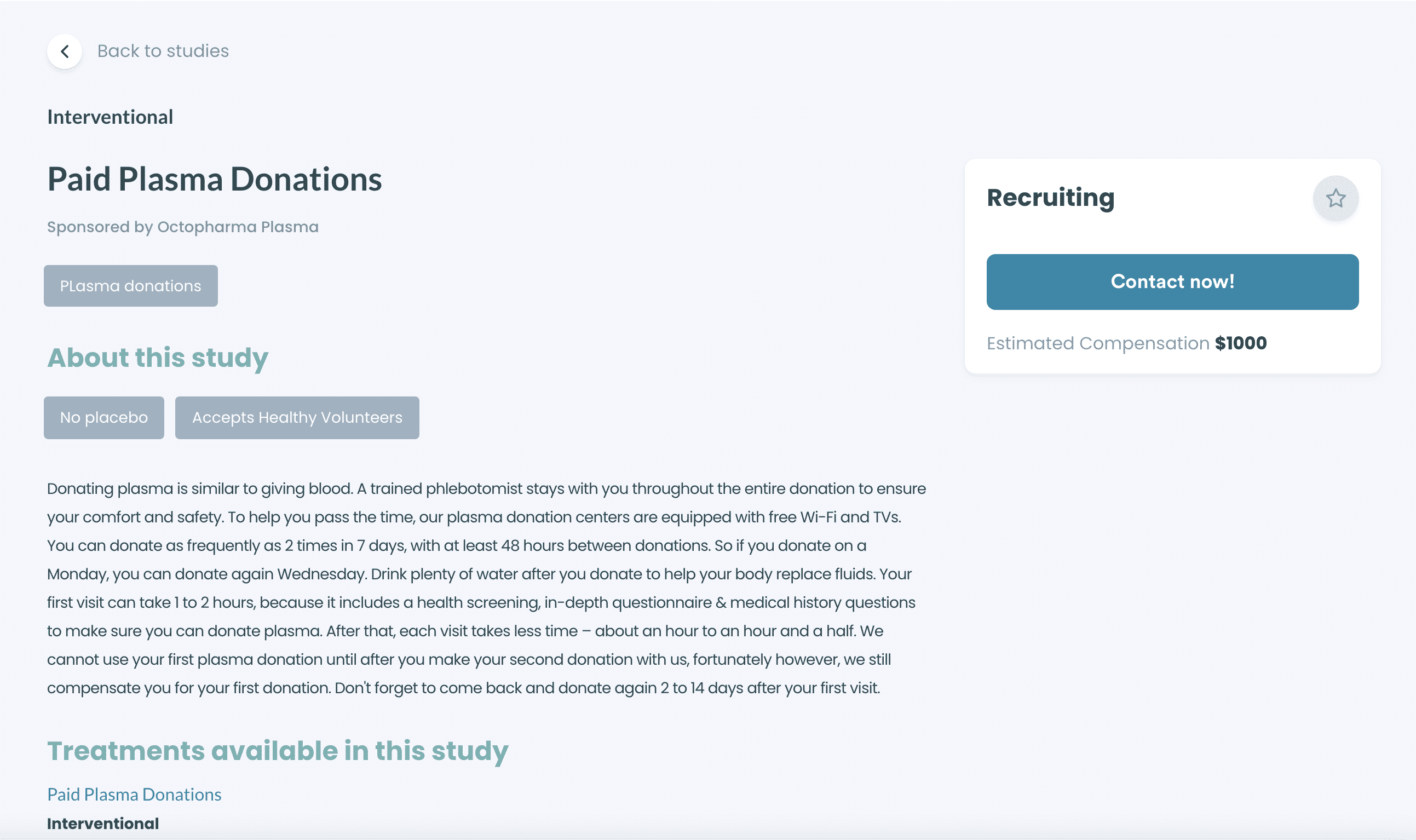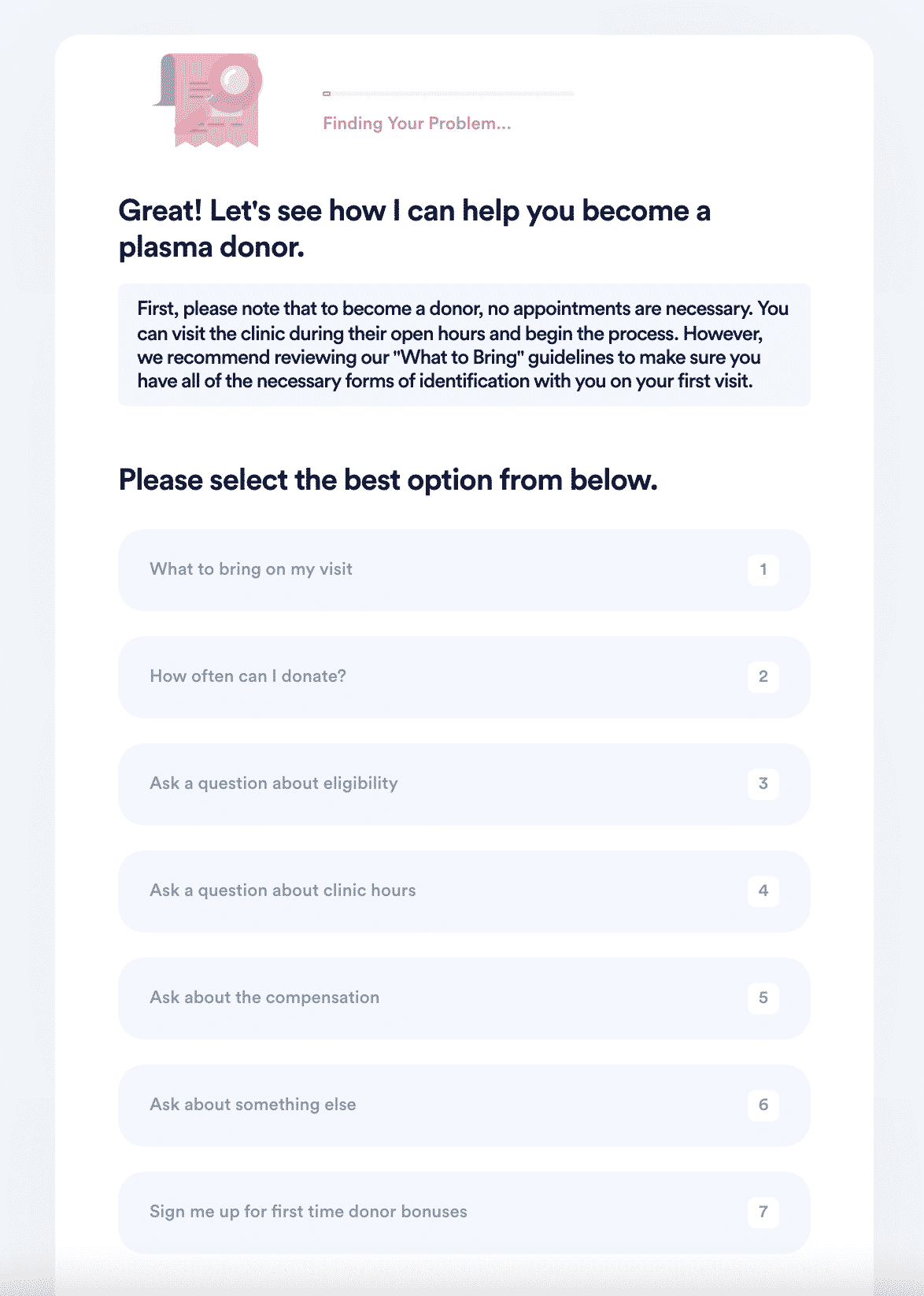Can You Donate Plasma If You Smoke Cigarettes?
Donating plasma is an easy but fulfilling way to improve other people's lives and make some money in the process. But with all strict eligibility criteria, you're stuck with the question; ?
The good news is that you can donate plasma if you smoke cigarettes. However, you'll need to avoid smoking 30 minutes before and after donating. You also must pass other eligibility requirements to qualify. You can contact your nearest donation center to learn more about the process, requirements, and compensation.
Alternatively, you can let DoNotPay take care of the hard work for you. DoNotPay will find the nearest donation site and help you answer any questions you might have regarding the process. We also provide insights into plasma donation, donation requirements, frequency of donation, compensation, and the plasma donation process, among others.
What Is Plasma and Why Should You Donate It?
Plasma is a light, yellow component of blood and makes about 55% of blood. It contains proteins, salts, and water and plays an essential role in fighting diseases and maintaining a proper pH balance, healthy blood volume, and blood pressure.
Plasma ensures our bodies get enough proteins to support immune system responses and blood clotting.
When you donate, your plasma is used to help patients with cancer, burn or shock, severe trauma, and clotting factor disorders. Plasma donations help in a range of ways, including:
- Restore blood pressure and volume status in patients who lose a significant amount of blood and electrolytes due to severe shock, burn, or trauma. Plasma also restores electrolyte levels.
- Blood clotting in patients with clotting factor deficiencies or liver disease. This prevents excessive loss of blood, which may lead to internal bleeding, organ damage, and even death.
- Frozen plasma can also help cancer patients deal with complications that arise due to the depletion of natural clotting factors.
Plasma Donor Eligibility Requirements
Plasma donations help create therapies that treat a range of life-threatening diseases and conditions. However, not everyone is eligible, so you may want to check with the nearest plasma collection center to see if you qualify. Generally, donors have to:
- Be generally well and fit
- Be 17 years or older
- Have enough blood to donate safely
- Live within specified miles
- Have proof of identity (Photo ID) and physical address
- Pass a basic physical exam
- Pass a primary health screen, blood test, and viral test (ex: HIV and hepatitis test)
Things to Keep in Mind Before Donating Plasma
Here’s what you should remember about plasma donation:
Before Your Plasma Donation
- Drink lots of water
- Do not smoke tobacco for an hour before donating
- Eat a healthy meal within two hours of your visit
- Avoid foods high in cholesterol or fat
- Avoid caffeine and alcohol before and on your donation day.
- Avoid strenuous exercise an hour before donation
- Get a good night's rest before donation
After Your Plasma Donation:
- Drink lots of water
- Eat a healthy meal within two hours of your visit
- Avoid tobacco for 30 minutes after donation
- Avoid strenuous exercise or heavy lifting for a day
Can You Donate Plasma if You Smoke Cigarettes?
Smoking cigarettes does not disqualify you from donating plasma. However, you want to avoid smoking at least 30 minutes before and after donating your plasma.
Smoking before the donation may increase your blood pressure and heart rate to levels outside the acceptable range for donation. And afterward may increase your risk of fainting or becoming dizzy.
Where Can You Donate Plasma?
You can donate plasma in the hospital or through biomedical companies. The American Red Cross also collects plasma donations. You can also find other donation centers. You can book your appointment online, but be sure to check the requirements beforehand.
- CSL has more than 270 different locations globally, with locations in 41 different states in America.
- BioLife Plasma Services has multiple locations in 35 different states.
- BPL Plasma has locations in 13 different states across the country.
Plasma Donation Locations and Compensation
Here is a list of plasma donation centers to get you started. The compensation you receive for your donation varies by organization, location, and the number of people who attend the center.
| Center | Compensation | Other Information |
| CSL Plasma | $20 for the first donation of the week and $20-45 for the second donation of the week | Regular donors make around $270 per month, but they can earn up to $700 with frequent donations and promotions. First-time donors get around $50 for each of their first five donations and make up to $1,000 in their first month. |
| BioLife Plasma | $20 for first-time visits and between $30 and 50 for second visits | On average, donors get about $200-280 per month; this amount can be higher for those who take advantage of promotions and other payments. BioLife Plasma has a one-time coupon for new donors that can help them earn up to $900 per month. |
| BPL Plasma | $20-60 per donation, depending on things like weight and referrals. | Donors can earn up to $300 monthly. |
| Red Cross | None | The Red Cross does not pay plasma donors. |
How to Donate Plasma on Your Own
There are over 730 licensed plasma collection centers in the US. Each company manages its operations differently but within the government's regulatory guidelines.
As a prospective donor, you'll need to find a center near you. You can do this through an online search or by asking for referrals. Once you identify a center near you, contact them to find the operating hours as well as the requirements.
Locating a donation center can be daunting, especially if you have no idea how to go about it.
Next Steps in Donating Plasma if You Can't Do it Yourself
If you're having difficulty locating a donation center near you or understanding the requirements or process, you may benefit from DoNotPay services. As part of our clinical trials product, DoNotPay can help you find the best plasma sites near you.
DoNotPay offers compensation estimates and outlines the eligibility requirements/donation process, so you know exactly what to expect. We'll also help you contact them if you have any questions or concerns, such as regarding your eligibility, store hours, compensation, or first-time bonuses.
Here's how you can use DoNotPay to become a plasma donor:
- Search "plasma donations" on DoNotPay and find the nearest donation clinic through our clinical trials product.

- Select the "Contact Now" button to learn more about eligibility criteria, contact the clinic with questions, or sign up for first-time donor bonuses.

- Verify your information and submit your inquiry! DoNotPay will contact the clinic on your behalf and make sure your questions get answered.

Why Use DoNotPay to Donate Plasma for Cash
Donating plasma is a great way to make some extra money. But the process and requirements can be confusing. Add that to the stress of finding the location and contacting them for details, and it all becomes frustrating. DoNotPay can do all these for you, saving you from having to do it yourself.
DoNotPay is fast, reliable, and easy. It also ensures success.
DoNotPay Works Across All Entities With the Click of a Button
DoNotPay doesn't just help you figure out whether you can donate plasma if you smoke cigarettes. It can also provide insights to the following:
- How often can you donate plasma?
- Can you donate plasma after a Covid vaccine?
- How old do you have to be to donate plasma?
- How long does it take to donate plasma?
- Can diabetics donate plasma?
What Else Can DoNotPay Do?
In addition to plasma donation, DoNotPay can help you solve a range of other problems across all industries with a click of a button. Examples include:
- Advance Health Care Directive
- Clinical Trials
- Insurance Claims
- Request Sick Leave
today to get started!


